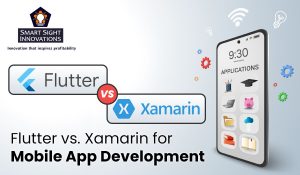 There are many frameworks and libraries available for creating mobile apps. The current need is a framework that implements new ideas and keeps up with the competitors. Though developing an app can be challenging and time-consuming, it can be profitable and exciting too. It is critical to select the appropriate framework for your project and have a plan to manage both the project and the budget.
There are many frameworks and libraries available for creating mobile apps. The current need is a framework that implements new ideas and keeps up with the competitors. Though developing an app can be challenging and time-consuming, it can be profitable and exciting too. It is critical to select the appropriate framework for your project and have a plan to manage both the project and the budget.
With so many frameworks, getting started can take a lot of work, and the best way to stay ahead is to be well-informed. Selecting the appropriate framework for your project and having a plan in place for managing the project and the budget is essential. Flutter, Ionic, React Native, Xamarin, Kotlin, and Angular are some of the best mobile app development frameworks that will advance your app design and development expertise and keep you ahead of the curve. In this article, we look at what Flutter and Xamarin bring to the table when it comes to mobile app development.
Xamarin
Xamarin is a Microsoft open-source, cross-platform framework to develop iOS, Android and Windows apps using a single C# and .NET codebase. Apps like ORO, MRW, Picturex, Storyo and APX are based on Xamarin. Developers either use Xamarin.Native or Xamarin.Forms to create mobile applications.
Flutter
Flutter is a mobile app SDK that allows you to create the finest native apps on iOS and Android. It is a mobile app development platform by Google that enables developers to create desktop, web and cross-platform apps. Google Ads, BeerCert, Xianyu by Alibaba and Postmuse are some apps built using the Flutter framework.
Flutter vs. Xamarin for Mobile App Development
Now that we know what these frameworks represent, let us compare Xamarin and Flutter to see what each offers.
1. Programming Language
The most important benefit of using a cross-platform framework for mobile app development is that it can use a single programming language to create iOS and Android apps.
Xamarin:
Xamarin uses C# to build cross-platform mobile apps. Microsoft has used Xamarin extensively. Developers use C# to build .NET frameworks, which have become prominent for their unique features like universality, functional programming and metaprogramming. With the help of Xamarin, C# developers can easily switch from developing websites to creating cross-platform mobile applications due to Xamarin’s versatility.
Flutter:
Flutter uses the Dart language. Java and JavaScript developers find it easy to understand the Dart syntax. It offers an excellent document on its official site that covers all bases.
Conclusion:
Though Dart has a unique set of features, developers rarely use it. C#, on the other hand, is more widely used and has existed for a relatively long time.
2. Architectural Technology
Xamarin:
Xamarin uses the Mono runtime for mobile app development. Mono uses the Unix kernel and the Objective-C runtime when developing for iOS. While for Android, it goes hand in hand with Android Runtime on Linux. Microsoft’s documentation describes the Android and iOS architecture utilized with Xamarin.
Flutter:
Flutter uses the Dart system, which includes most of the default components. Dart offers frameworks like Cupertino and Material Design that provide the fundamental tools needed to build mobile applications.
Conclusion:
Unlike Flutter, Xamarin does not support Swift and Kotlin runtimes. This is because Flutter provides many built-in technologies by default.
3. Installation
The installation process must be easy for the users and reduce the learning curve for developers.
Xamarin:
Xamarin needs Visual Studio IDE, a great tool that gives you access to all the required features to work. Before installing Xamarin iOS and Xamarin Android, you must first install Visual Studio IDE. There are very few tools for installing Xamarin without using Visual Studio.
Flutter:
Before installing Flutter, you must first download the binary for the particular OS. Once done, you must add Flutter to the system path. Flutter does not restrict you to a specific IDE because it works with several IDEs — Android Studio, IntelliJ IDEA, etc.
Conclusion:
Although Xamarin restricts you to Visual Studio, Flutter installation too involves additional processes. However, both systems have excellent installation guides.
4. Support
Developers build a community to share knowledge as soon as they master a language. Community support is essential when you run into problems or require assistance.
Xamarin:
Xamarin is older than Flutter and has a larger community. They even have a Xamarin forum where you may ask any Xamarin-related question. Furthermore, the community creates many open-source modules to enhance the framework’s capability.
Flutter:
Flutter has also quickly grown as a community. Google’s aggressive marketing has led to a unique Flutter communication channel for its community.
Conclusion:
Xamarin and Flutter have many online tutorials, courses and blog posts for learning. While Microsoft backs Xamarin, Flutter is backed by the Google team.
5. UI Components and API
It is crucial that when you develop a cross-platform app, it has a native appearance and feel.
Xamarin:
Xamarin uses native component API to develop its UI, which gives the app a native feel. It is an established and reliable framework that offers features for creating native UI elements for OS such as iOS, Android, macOS and tvOS.
Flutter:
Flutter does not provide native UI components. Instead, it offers its user interface by sketching it on a Skia canvas.
Conclusion:
Flutter can’t deliver the same look and feel that Xamarin does. Your app’s UI will look better on Xamarin than on Flutter.
Xamarin and Flutter are dependable choices for building a framework and have their share of advantages and disadvantages. If you are still deciding what to consider before developing a mobile app, you can refer to ‘A step-by-step guide to mobile app development.’











